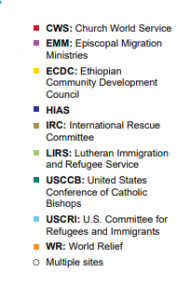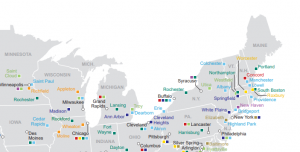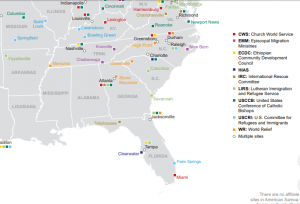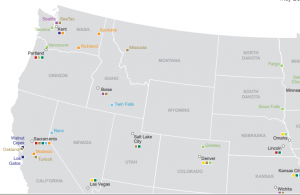Editor: Thanks to David James for another excellent analysis of the vital question about the resettlement of refugees in the US—do states have any right to say no to the placement of UN/US State Department selected refugees within their borders?

James says yes, and explains that a Migration Policy Institute paper by a legal expert confirmed that in 2011.
Soros Funded Immigration Think Tank Said States Can Reject Refugees
The self-described non-partisan Soros-funded Migration Policy Institute (MPI), was light years ahead of President Trump about the limited authority of the federal government to force refugee resettlement in states which say no thanks.

In 2011, the MPI issued a paper titled, The Faltering U.S. Refugee Protection System: Legal and Policy Responses to Refugees, Asylum Seekers, and Others in Need of Protection, written by lawyer Donald Kerwin, Exec. Dir. of Center for Migration Studies and former ED of the Catholic Legal Immigration Network, a subsidiary of the US Conference of Catholic Bishops.
The USCCB is also one of the busiest federal resettlement contractors whose last available financial statement in 2017 showed $50 million dollars in federal grants comprising 94% of the USCCB budget for migration and refugee services.
States have rights!
Kerwin wrote that states need to say yes to refugees before the State Department’s Bureau of Population, Refugees & Migration (PRM) resettles refugees in any state:
Resettlement agencies (many affiliated with VOLAGs] meet with state and local officials on a quarterly basis regarding the opportunities and services available to refugees in local communities and the ability of these communities to accommodate new arrivals. They also consult with the state refugee coordinator on placement plans for each local site. PRM provides ORR and states with proposed VOLAG placement plans. If a state opposes the plan, PRM will not approve it.
During a 2010 U.S. Senate Foreign Relations Committee hearing, testimony from Fort Wayne, Indiana and Clarkson, Georgia city officials stated that they had never been consulted or given notice by resettlement agencies or PRM about upcoming resettlement plans.
There’s plenty of evidence that even if these consultations actually take place, they only happen between like-minded bureaucrats and not with say, state legislators on the finance committees.
Remember too, that in states which have withdrawn from the resettlement program, the state refugee coordinator is typically an NGO which has its own refugee resettlement program heavily dependent on keeping the federal cash flowing to its bank account.
Of course, there is no accounting for the state taxpayer dollars being forcibly taken to pay for the federal program, even if a state has already withdrawn.
Another dirty little secret about refugee placements is that decisions about “capacity” at the local level for resettlement is left up to the federal contractors whose financial well-being is directly tied to how many refugees they can bring in during the fiscal year.
The US General Accounting Office found that “capacity” can pretty much mean anything the contractor wants it to mean including its own “long-term funding needs.”
It’s not clear what Kerwin’s basis was for his concession to a state’s authority to reject a proposed refugee resettlement plan. But Tennessee’s lawsuit offers a legally viable and coherent explanation – the federal government’s admission to shifting the costs of its refugee program to state governments in violation of the Tenth Amendment and U.S. Supreme Court precedent.
Not only that, but the refugee resettlement program was designed originally as an opt-in. The 1980 Act has no language authorizing a replacement after state withdrawal but is structured as an opt-in program for states just like other federal spending programs. It wasn’t until 1994, that the state withdrawal/ORR replacement provisions were added to the regulations.
When a state chooses to withdraw from the federal program ORR, gave itself, by regulation, what the enabling legislation didn’t – the authority to appoint a replacement state designee. Importantly, appointing a replacement state designee, is permissive, not mandatory. In each state that has chosen to withdraw, however, ORR has appointed an NGO resettlement agency as the state’s replacement designee. This has resulted in forced state participation and forced state expenditures for the federal program.
President Trump’s Executive Order reads as if a state can override consent by local governments to bring in refugees. However, the operating details won’t be known until HHS and the State Department issue their guidance on the consent.
Of course, the activist judge who will be deciding the lawsuit brought by the VOLAGs challenging Trump’s order will have to choose between following the law or legislating from the bench.
Local activists would do well to explain the real fiscal implications to their state legislators and governor of the state being forced to pay the federal freight that Congress has chosen to shift to the state, taking state funding priorities away from the state’s most vulnerable citizens.
This post if filed in my Comments worth noting/guest posts category.










